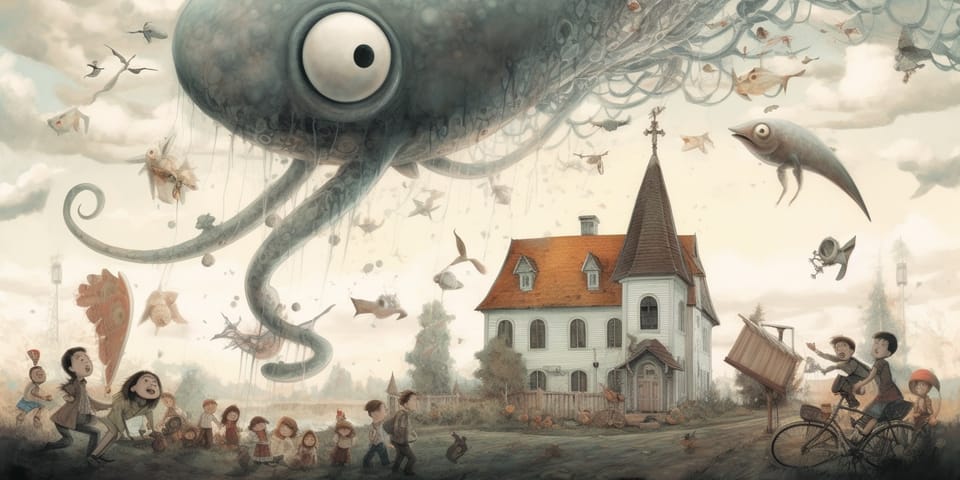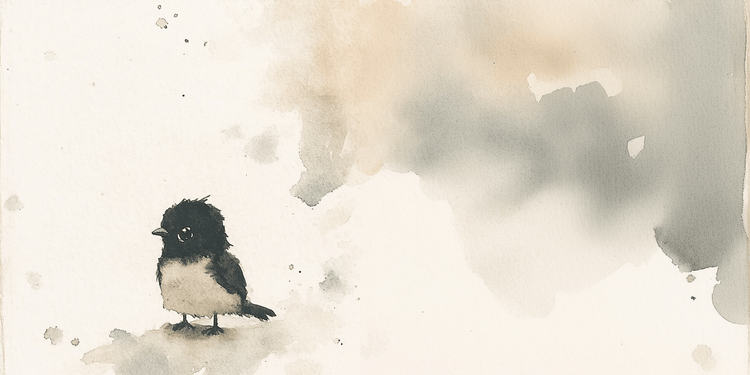(A)theist Trust-Squid Making Friends

Welcome to the February 2024 edition of...
What I'm Into, What I'm Up To
#43
Happy belated Valentine's Day and happy Lent everyone!
I don't know if you can wish someone a happy Lent, but there must be some appropriate way to acknowledge the season of Lent to people who observe it....
Okay, I just looked it up.
According to Google's 'generative AI' search result, 'Some say that you shouldn't say "Happy Lent". One alternative is to say "Have a blessed Lent". Another option is to say "May you all have a blessed and reflective Lent".'
Another search result, this one from Hindustan Times (interesting), says, 'How do you wish someone a good Lenten season? "May this Ash Wednesday bring you peace and spiritual insight. On this solemn occasion of Ash Wednesday, may you find strength in prayer, courage in sacrifice, and grace in repentance. Sending you warm wishes for a blessed Lenten season."'
I find the 40 days of Lent interesting because growing up as an Evangelical Christian in the U.S., we did not pay much attention to Lent. It was considered more of a Catholic thing, so didn't really apply to us. Easter, for us, seemed to come out of nowhere, wild and sudden, whereas, with Lent, you get this nice long build-up.
In general, I like the calendar of the liturgical church denominations. I like that there's always something going on throughout the year, something to pay attention to, something to orient yourself towards.
Which is a great segue!
What I'm Into
- Atheism For Lent, an online course by Peter Rollins — this is something I've thought about doing for several years now and am finally participating in this go round.
Pete Rollins is an Irishman living in L.A. and a philosopher. He's got a Youtube channel and a podcast with Elliott Morgan called The Fundamentalists.
Almost everything he says is over my head, but I can't stop listening because the stuff I do understand is fascinating, and the Irish accent is so enjoyable to listen to, and he's not trying to beat anyone over the head with any particular idea or agenda. He just seems to really love talking about what deep thinkers have said about life and the universe.
The title of this course is not misleading, exactly, but I think is meant to be a little shocking and a little uncomfortable, since it is (I think) more designed for religious people than for atheists or agnostics.
To the best of my understanding (I'm only a few days in), the course is meant to lead participants through reflections each day from thinkers long gone, people like Thomas Aquinas and Charles Darwin, arguing for or against or about the existence of God.
I think Pete's aim is to get people like me (and people not like me) into uncomfortable territory, knocking us away from the certainties our minds understandably latched onto in our formative years, and open us up to the many proposed notions about our existence and meaning and all the difficult questions about being human which keep getting asked and pondered century after century.
I'll report back next month and let you know how it's going. - The Surprising Rebirth Of Belief In God, a podcast by Justin Brierley — So... I did not have any intention of focusing so heavily on the topic of atheism versus theism this month, but it just sort of happened.
I heard about this podcast on another podcast I frequent, The Holy Post, where Kaitlyn Schiess mentioned how good a job she thought Justin Brierly had done with this series. I didn't connect the dots at first, but I know Justin Brierly through another podcast I listen to, Ask N. T. Wright Anything, where Justin poses questions to Tom Wright (one of the foremost theologians in the world and high on my list of personal gurus) submitted by a world-wide audience.
I'm only a few episodes into The Surprising Rebirth, but I can say it is very well produced, also very different from the Atheism For Lent course. This one is more of a recent history docu-series, definitely more agenda-driven, so I'm reserving judgement on it 'til I'm further in.
My main takeaway so far is that atheists as a collective and atheism as a movement have all the same frustrating problems that religious collectives and movements have. They have their own 'good old days' people versus 'woke' people, their own Trump people versus never-Trump people, their own racism problems, sexism problems, and ideological problems.
So the whole idea that religion is the root cause of all the problems in the world certainly seems to ring hollow, based on what I've learned from this podcast.
I didn't know any of this before. I tend to give all other religions and ideologies the benefit of the doubt, while criticizing my own religious background and culture with excruciating judgement (which is how I wish everyone treated the other 'tribes' versus their own tribe, honestly). - Where Did You Park Your Spaceship, a novel by Rob Bell — I finished this one a few days ago and I'm still processing it.
I think I might read it again.
It's not what I was expecting but I also didn't know exactly what to expect.
I also wasn't sure how I would like Rob's fiction. I like his non-fiction and I like his podcast talks, and he was amazing at the 2-day event this summer, but these are all different skill sets and you never know how things will translate from one arena to another.
It's definitely a Rob Bell book, if you know what I mean, but it's also a really easy to read and compelling book about stuff that doesn't seem like it should be easy to read and compelling, like a guy working in a bakery on a planet he's been assigned to observe and report on by his higher-ups. That's not a book I would normally read, but I did, and it was a very good read.
8/10, would recommend. - Squid Game: The Challenge, a reality competition show on Netflix — New year, new reality shows to get caught up in.
As any of you who are regular readers or friends of ours know, Wendy is the sole reason I get sucked into all these reality shows, and the shows about cults, and the period romance dramas.
Neither of us watched the actual Squid Game show, because I wanted to be able to sleep at night. I understand the premise to be 'game show with fatal consequences,' but you don't need to have watched Squid Game to get into Squid Game: The Challenge.
As Wikipedia so eloquently explains, 'Squid Game: The Challenge is a ten-episode British reality competition television series based on Squid Game, the South Korean drama. The show features 456 players (the largest cast in reality TV history) competing for US$4.56 million, the largest single cash prize in reality television history.'
Its 456 people trying to outlast everyone else through crazy challenges to be the one remaining player at the end who wins the gazillion dollar prize.
It's compelling, if also edge-of-your-seat stressful. Turns out, people don't have to die for a show to be anxiety-inducing.
Pretty sure most of the contestants will be in therapy for a long, long time. - The Trust, (also) a reality competition show, (also) on Netflix — This one is actually fairly similar to the above show, except it's only a handful of people and it doesn't have to come down to only one winner at the end.
Premise: a bunch of random people in a giant house by the ocean in the tropics (we looked it up—Dominican Republic) decide each episode whether to vote someone out of 'the trust' or keep the group together for the jackpot prize at the end.
More people means less money per person, but voting people out raises suspicions and paranoia, not to mention really eating away at the kumbayah feeling around the mansion.
We had to wait for the final two episodes, but they're all out now so you can binge right through.
What I'm Up To
- Finishing the Skytrails series, hopefully once and for all — I mentioned before I divided the book into 3 parts, about 30k words each, so like novella-sized chunks.
The first two parts are published and available at all the major online ebook retailers.
This third part has been a slog, and I know it would be far better for me to say it's been such a joy and so fun to write, but a slog for an author does not always mean a slog for the reader. Some of the hardest parts of Greysuits for me to write were also some people's favorite parts (mostly the fight scenes).
Anyways, I've always struggled with endings and this one is no different. Hopefully it will all be worth it...
...Well, it will be worth it if I can finally put this book/trilogy to rest and move on to other projects—that is my once and future dream. - Working to bring a Creative Mornings chapter to my city.
- Trying to make friends — I've decided 2024 is the year of making friends in the actual place where I actually live.
I've talked to a few new people, been invited to play golf sometime, and have a standing obligation to invite a family whose daughter goes to pre-K with Harper over for dinner sometime.
Making friends is so much harder now than it used to be, but I believe it's more important than it's ever been.
That's all for now, folks. Until next month, good luck and Godspeed!
— Nate






Member discussion